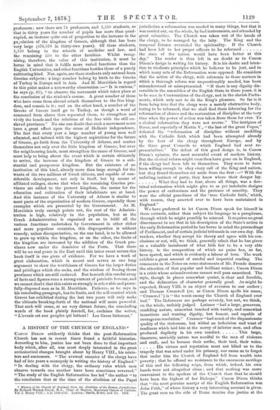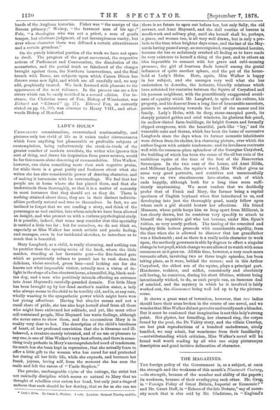A HISTORY OF THE CHURCH OF ENGLAND..
CANON DIXON evidently thinks that the post-Reformation Church has not in recent times found a faithful historian. According to him, justice has not been done to that important body which, after all; was most deeply interested in the great ecclesiastical changes brought about by Henry VIII., his minis- ters and successors. "The avowed enemies of the clergy have had of late years a monopoly in writing the history of England." "In dealing with the clergy, the ordinary rules which men observe towards one another have been sometimes reversed." "The study of the English Reformation has led" the author "to the conclusion that at the time of the abolition of the Papal
* History of the Church of England, front the Abolition of the Roman Jurisdiction. By Richard Watson Dixon, M.A., Vicar of Hayton, Honorary Canon of Carlisle. Vol. I. Henry VIII.; A.D. 1529-1537. London: Smith, Eder, and Co. 1878.
' jurisdiction a reformation was needed in many things, but that it- was carried out, on the whole, by bad instruments, and attended by great calamities. The Church was taken out of the hands of the clergy, to be managed by the laity. The King and the temporal Estates overruled the spirituality. If the Church
had been left to her proper officers to be reformed the state of the nation would have been better at this day." The reader is thus left in no doubt as to Canon Dixon's design in writing his history. It is his desire and inten- tion to vindicate principles which he believes to be just, and to which many acts of the Reformation were opposed. He considers that the action of the clergy, with reference to those matters in which a thorough reform was unquestionably needed, has been misunderstood or misrepresented. "If there is any dignity dis- cernible in the assemblies of the English State in those years, it is to be seen in Convocations of the clergy, not in the slavish Parlia- ments, which only met to do the King's pleasure. So far is it from being true that the clergy were a merely obstructive body, hating to be reformed, that we shall find them labouring for the reformation of abuses and the restoration of discipline at the very time when the power of action was taken from them for ever. To a clerical reformation they were not averse." The intrigues of Rome, and especially of Martin V., "the last of the great Popes," defeated the "reformation of discipline without meddling with the Catholic faith which had been attempted already by the best of the clergy throughout Europe, and by the three great Councils to which England had sent re- presentatives." The defeat of this good design is, in Canon Dixon's opinion, the most mournful event of modern history. But the clerical reform might even then have gone on in England, if the clergy had been left to themselves. They seem to have been willing enough to obey every call of the King and nation, but they found themselves set aside from the first :—" With the unfailing instinct of party, they knew where their danger lay.
What they had to fear, above all things, was a doc- trinal reformation which might give to as yet indefinite designs the power of enthusiasm and the pretence of sanctity. They were the official guardians of the true Catholic faith,' which, with reason, they asserted ever to have been maintained in England."
We have preferred to let Canon Dixon speak for himself in these extracts, rather than subject his language to a paraphrase, through which he might possibly be misread. It requires no great discernment to see that in his description of the State's action in the early Reformation period he has borne in mind the proceedings of Parliament, and of certain judicial tribunals in our own day. His readers, whether they accept his theory and agree with his con- clusions or not, will, we think, generally admit that he has given us a valuable instalment of what bids fair to be a very able history, in the composition of which no pains has, so far, been spared, and which is evidently a labour of love. The work exhibits a great amount of careful and impartial reading. The comments in the Notes on some statements of Mr. Froude deserve the attention of that popular and brilliant writer ; Canon Dixon is a critic whose animadversions cannot well pass unnoticed. The style, though in places somewhat quaint, is clear and forcible, and the delineation of character generally good. As might be expected, Henry VIII. is an object of aversion to our author ; and Thomas Cromwell (or, as Canon Dixon spells his name, " Crumwel ") is "the worst enemy the Church of England ever had." The Reformers are perhaps severely, but not, we think, on the whole, unfairly judged. Latimer "had a large, generous, confiding nature, somewhat touched with vanity, and somewhat incautious and wanting dignity, but honest, and capable of courageous resolution." Cranmer "had much of the dispassionate quality of the statesman, but withal an indecision and want of readiness which laid him at the mercy of inferior men, and often produced duplicity in his own conduct This large, timorous, unwieldy nature was needful to the men of violence and craft, and he became their scribe, their tool, their voice.
His virtues and reputation must not blind us to the tragedy that was acted under his primacy, nor cause us to forget that under him the Church of England fell from wealth into poverty ; that he offered no resistance to the enormous sacrilege of this and the following reign, from which, indeed, his own hands were not altogether clean ; and that nothing was more convenient to the spoilers of the Church than that he should have been the highest of her Bishops." Canon Dixon thinks that "the most genuine martyr of the English Reformation was John .Frith," of whose history a very interesting account is given. The great men on the side of Rome receive due justice at the hands of the Anglican historian. Fisher was "the martyr of the Roman primacy ;" Wolsey, "the foremost man of his age ;" Pole, "a theologian who was not a priest, a man of gentle temper, but obstinate judgment, of not inconspicuous vanity, but over whose character there was diffused a certain attractiveness and a certain grandeur."
On the purely historical portion of the work we have not space to dwell. The progress of the great movement, the respective actions of Parliament and Convocation, the dissolution of the monasteries, and the partial truth or falsehood of the charges brought against them, the Northern insurrections, and the final breach with Rome, are subjects upon which Canon Dixon has thrown some new light, and which are all carefully and, we may add, graphically treated. We look forward with pleasure to the appearance of the next Volumes. In the present one are a few errors which can be easily rectified in a second edition. For in- stance, the Christian name of Fox, Bishop of Winchester, was Richard not " Edward " (p. 27). Edward Fox, as correctly stated on pp. 64, 309, was almoner to Henry VIII., and after- wards Bishop of Hereford.































 Previous page
Previous page